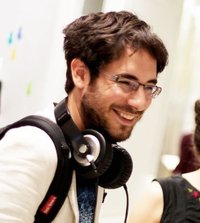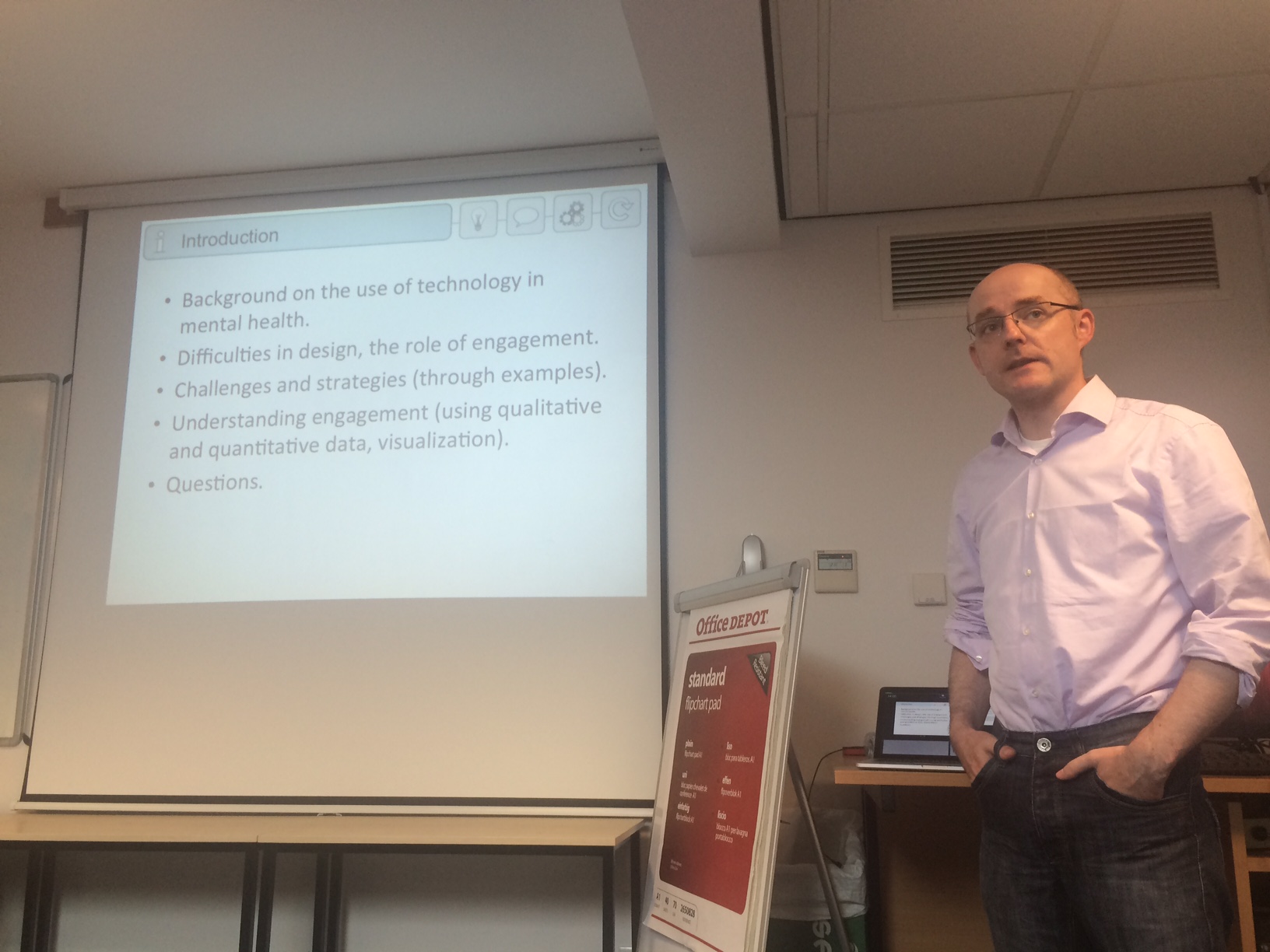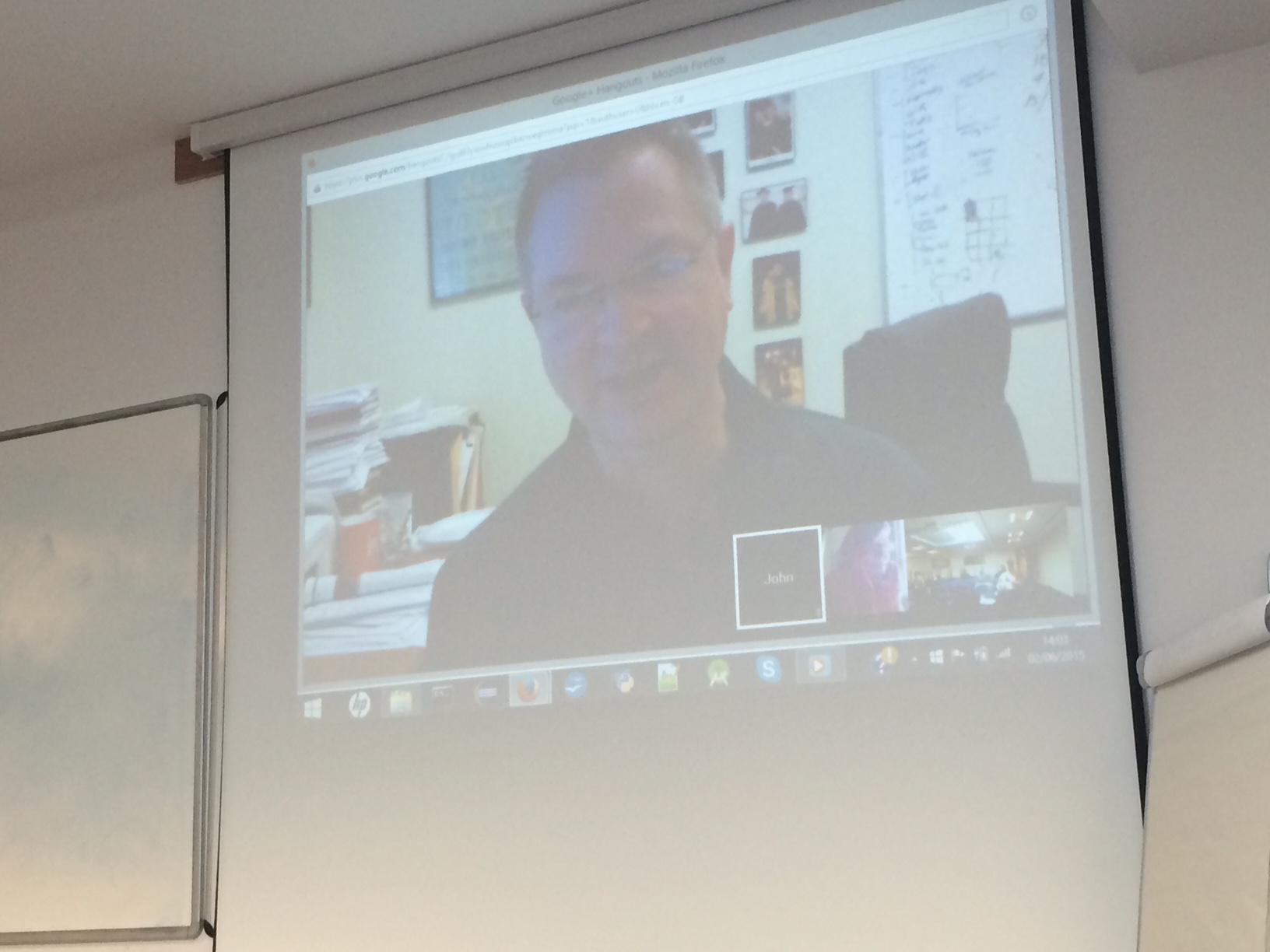<!–Speaker: Andruid Kerne, Texas A&M, USA
Date/Time: 2-3pm June 26, 2015
Location: CS1.33a, University of St Andrews–>
 Abstract:
Abstract:
Centuries ago, the technology of movable type vaulted human consciousness and expression from oral performance—improvisational— to writing, fixed by letters and words. The Interface Ecology Lab investigates new technologies that transform human expression. We engage the human body with the digital. We use cloud and web to maximize impact. We investigate how curation, exploration, and body-based interaction support expression and ideation. MORE
News
<!–Speaker: Gavin Doherty, Trinity College Dublin
Date/Time: 2-3pm June 16, 2015
Location: CS1.33a, University of St Andrews–>
Abstract:
Mental illness is one of the greatest social and economic challenges facing our society.
The talk will consider at some of the different ways in which technology (and HCI research) can help, with a particular focus on the problem of engagement. Taking examples from a series of projects to develop novel technologies for use in the mental health space, we will see some of the unique issues and challenges which come from working in this domain, and the steps which can be taken to address them. The SilverCloud platform, designed to deliver range of engaging and effective clinician-supported mental health interventions, will be used as a specific example to discuss the topics of evaluation and dissemination. Development of a suite of programmes and a number of partnerships based on the platform have enabled the delivery of supported online interventions to tens of thousands of patients in a range of public and private healthcare services worldwide.
Bio:
Dr. Gavin Doherty is an Associate Professor in the School of Computer Science and Statistics at Trinity College Dublin, and co-founder of SilverCloud Health. He completed his doctorate at the University of York, before undertaking postdoctoral work at CNR in Pisa and the Rutherford Appleton Laboratory in the UK before moving to TCD. He is interested in design for specific application areas, and has led a number of interdisciplinary projects in a number of different domains. A major focus of his work over the last decade has been on the design of technologies for mental health. The aim has been to develop systems which can increase access to, increase engagement with, and assist in improving the outcomes of mental health interventions.
This seminar is part of our ongoing series from researchers in HCI. See here for our current schedule.
<!–Speaker: John Stasko, Georgia Institute of Technology
Date/Time: 2-3pm June 2, 2015
Location: CS1.33a, University of St Andrews–>
Abstract:
As the field of information visualization matures, researchers are able to reflect on, and perhaps even question, some long-accepted notions from the area. In this talk, I focus on three such notions:
* Representing network data through force-directed node-link diagrams
* Focusing on visual representation first and foremost
* Evaluating visualizations through user studies and experiments
Although these ideas clearly have value as evidenced by their acceptance and longevity, I have begun to question the wisdom of each. In this talk I’ll explain my concerns about these notions and I’ll suggest a new, alternative approach to each as well. To support these arguments, I will describe a number of research projects from my lab that illustrate and exemplify the new approach.
Bio:
John received the B.S. degree in Mathematics at Bucknell University in Lewisburg, Pennsylvania (1983) and Sc.M. and Ph.D. degrees in Computer Science at Brown University in Providence, Rhode Island (1985 and 1989). He joined the faculty at Georgia Tech in 1989, and he is presently a Professor in the School of Interactive Computing in the College of Computing. His primary research area is human-computer interaction, with a focus on information visualization and visual analytics. John is a senior member of the ACM and IEEE. He was named an ACM Distinguished Scientist in 2011 and an IEEE Fellow in 2014. He also received the 2012 IEEE VGTC Visualization Technical Achievement Award. In 2013 John served as General Chair of the IEEE VIS conferences in Atlanta, and he was named an Honorary Professor in the School of Computer Science at the University of St. Andrews in Scotland.
This seminar is part of our ongoing series from researchers in HCI. See here for our current schedule.
Visualizing and writing variable-free compositional relational programs.
<!–Speaker: Gorkem Pacaci, Uppsala University
Date/Time: 2-3pm May 20, 2015
Location: JC1.33a, University of St Andrews–>
Abstract:
Representing argument binding in compositional relational programs is an issue due to the syntactic problems. We first present our former research on using visualization to overcome this problem, and relevant user studies, and go on to discuss our recent work on syntactic improvements in solving the same problem. We are looking forward to feedback on this early stage research.
Bio
Gorkem studied his masters degree in Abertay Dundee in Computer Games Technology, delivering a thesis on Optimizing collision detection in games. After working in games for a while, he started studying towards a doctorate degree in Uppsala University, Sweden. His study focuses on the representation of relational programming languages
On lions, impala, and bigraphs: modelling interactions in Ubiquitous Computing.
<!–Speaker: Tom Rodden, University of Nottingham
Date/Time: 2-3pm May 19, 2015
Location: CS1.33a, University of St Andrews–>
Abstract:
As ubiquitous systems have moved out of the lab and into the world the need to think more systematically about how there are realised has grown. This talk will present intradisciplinary work I have been engaged in with other computing colleagues on how we might develop more formal models and understanding of ubiquitous computing systems. The formal modelling of computing systems has proved valuable in areas as diverse as reliability, security and robustness. However, the emergence of ubiquitous computing raises new challenges for formal modelling due to their contextual nature and dependence on unreliable sensing systems. In this work we undertook an exploration of modelling an example ubiquitous system called the Savannah game using the approach of bigraphical rewriting systems.
This required an unusual intra-disciplinary dialogue between formal computing and human- computer interaction researchers to model systematically four perspectives on Savannah: computational, physical, human and technical. Each perspective in turn drew upon a range of different modelling traditions. For example, the human perspective built upon previous work on proxemics, which uses physical distance as a means to understand interaction.
In this talk I hope to show how our model explains observed inconsistencies in Savannah and ex- tend it to resolve these. I will then reflect on the need for intradisciplinary work of this form and the importance of the bigraph diagrammatic form to support this form of engagement.
Bio
Tom Rodden (rodden.info) is a Professor of Interactive Computing at the University of Nottingham. His research brings together a range of human and technical disciplines, technologies and techniques to tackle the human, social, ethical and technical challenges involved in ubiquitous computing and the increasing used of personal data. He leads the Mixed Reality Laboratory (www.mrl.nott.ac.uk) an interdisciplinary research facility that is home of a team of over 40 researchers. He founded and currently co-directs the Horizon Digital Economy Research Institute (www.horizon.ac.uk), a university wide interdisciplinary research centre focusing on ethical use of our growing digital footprint. He has previously directed the EPSRC Equator IRC (www.equator.ac.uk) a national interdisciplinary research collaboration exploring the place of digital interaction in our everyday world. He is a fellow of the British Computer Society and the ACM and was elected to the ACM SIGCHI Academy in 2009 (http://www.sigchi.org/about/awards/).
Organisers:
Dr Miguel Nacenta and Dr Uta Hinrichs
Date:
Friday May 8th, 11:00 to 16:30
Location:
School of Computer Science, University of St Andrews
John Honey Building, North Haugh (KY16 9SX)
Open to the SICSA community, the University of St Andrews community
No charge, but limited places.
Registration:
Please sign up here at Eventbrite


Workshop By Prof Sheelagh Carpendale and Dr Samuel Huron
Workshop Focus and Motivation
We are moving into a new era of a data driven society. The collection and use of data abounds in science, industry, government, commerce, and also in our personal lives both at work and socially. Data is being continually collected, and being stored in increasingly massive data warehouses in the expectation of later analysis and use. The common belief is that through this data, we, as a society, can gain new insights and learn how to run our lives, businesses, cities, etc. more efficiently, and effectively. Yet society is increasingly, if only vaguely aware of the volume and variety of data that we are accruing on a daily basis. However, there is a gap, how can data lead to new insight?
To realise even the beginning of the promised potential of this data, we must become data literate. To be an effective data driven society this notion of data literacy must extend beyond the data literacy of a few experts to a wider population. We must each become, at least somewhat, data literate.
To test the waters of what might possibly constitute data literacy exercises, we will hold a workshop based on sketch based visualisation and constructive visualisation on May 8th 2015.
This will be a hands-on workshop where we will conduct exercises on data characterisation, visualisation data sketching, and constructive visualisation. There will be several short talks on basic data visualisation concepts, discussions, sketching sessions and constructive visualisation sessions.
In this workshop you employ the basic visual variables to construct meaningful representations, the dynamic manipulation of spatial positioning to enable spatial reasoning, and through these practices you will become aware of the wide variety of ways that people can think about data.
This workshop is designed for professionals, academics, and anyone with an interest in visualisation and data science. No programming experience required.
Bios
Sheelagh Carpendale is a SICSA Distinguished Visiting Fellow to Scotland this May. A Professor in the Department of Computer Science at the University of Calgary where she holds a Canada Research Chair in Information Visualisation and NSERC/AITF/SMART Technologies Industrial Research Chair in Interactive Technologies. She has received many awards including the E.W.R. NSERC STEACIE Memorial Fellowship; a BAFTA (British Academy of Film & Television Arts Interactive Awards); an ASTech Innovations in Technology Award; and the CHCCS Achievement Award. She leads the Innovations in Visualization (InnoVis) research group and initiated interdisciplinary graduate programs in Computational Media Design. Her research on information visualisation, large interactive displays, and new media draws on her background in Computer Science, Art and Design (Simon Fraser University, Emily Carr, Institute of Art and Design, Sheridan College, School of Design). She has found the combined visual arts and computing science background invaluable in her information visualisation research.)
Samuel Huron is Lead Designer at the Institute for Research and Innovation of the Pompidou Center (Paris) and Post doctorate researcher at the University of Calgary in the Innovis Lab. He successfully defended his Ph.D. on “Constructive Visualization: A token-based paradigm allowing to assemble dynamic visual representation for non-experts” at the Pompidou Center (Paris, France) in September 2014, under the supervision of Jean-Daniel Fekete, Vincent Puig and Sheelagh Carpendale. He graduated first candidate in 2009, Master in New Media Art in Paris 1 Panthéon-Sorbonne. He participated in several design research groups at Ecole National Supérieur des Arts décoratifs. For over ten years he has carried out multiple creative web projects for a broad range of civic, cultural and corporate clients. His interest focuses particularly on computer human interaction and visual languages.
 In early April, members of SACHI will presented their practice talks for papers accepted to CHI 2015, the ACM CHI Conference on Human Factors in Computing Systems 2015. This pre-CHI day, is a SICSA HCI event hosted in Heriot Watt University.
In early April, members of SACHI will presented their practice talks for papers accepted to CHI 2015, the ACM CHI Conference on Human Factors in Computing Systems 2015. This pre-CHI day, is a SICSA HCI event hosted in Heriot Watt University.
<!–Speaker: Mel Woods, University of Dundee
Date/Time: 2-3pm April 28, 2015
Location: CS1.33a, University of St Andrews–>
Abstract:
Blue heritage plaques pepper the UK landscape expounding officially validated narratives celebrating past events, people, and buildings. This seminar will discuss a novel method that draws on this specific cultural context to generate reflective, nano-stories, documenting them through populating a place, physical space, and an online data repository. The guerrilla blue plaque method was designed to support people to reflect on possible futures, in this instance the theme of future cities. The seminar will demonstrate how using critical design artefacts can help support understanding of future hopes, needs, and goals for individuals and communities. It will also discuss the method as a feedback mechanism for participatory design, citizen engagement and emergent outcomes from the latest deployment.
This work was initially developed as part of a UK arts and digital media festival and exhibited recently at Microsoft Research Lab, Cambridge at RTD 2015.
Bio:
Mel is Reader at Duncan of Jordanstone College of Art and Design, University of Dundee. In her research she has developed and explored interaction between people to support discovery, foster creativity and affect. Throughout her academic career she has sustained a critical enquiry in art and design, creating digital artefacts, interfaces, prototypes and exhibits using novel methods and evaluation techniques.
This seminar is part of our ongoing series from researchers in HCI. See here for our current schedule.
<!–Speaker: Nicolai Marquardt, University College London
Date/Time: 1-2pm April 13, 2015
Location: CS1.33a, University of St Andrews–>
Abstract:
Despite the ongoing proliferation of devices and form-factors such as tablets and electronic whiteboards, technology often hinders (rather than helps) informal small-group interactions. Whereas natural human conversation is fluid and dynamic, discussions that rely on digital content—slides, documents, clippings—often remain hindered due to the awkwardness of manipulating, sharing, and displaying information on and across multiple devices. Addressing these shortcomings, in this talk I present our research towards fluid, ad-hoc, minimally disruptive techniques for co-located collaboration by leveraging the proxemics of people as well as the proxemics of devices. In particular, I will demonstrate a number of cross-device interaction techniques—situated within the research theme of proxemic interactions—that support nuanced gradations of sharing. I will also introduce different novel hybrid sensing approaches enabling these interaction techniques and discuss future research directions.
Bio:
Nicolai Marquardt is Lecturer in Physical Computing at University College London. At the UCL Interaction Centre he is working in the research areas of ubiquitous computing, physical user interfaces, proxemic interactions, and interactive surfaces. He is co-author of the books Proxemic Interactions: From Theory to Practice (Morgan & Claypool 2015) and Sketching User Experiences: The Workbook (Elsevier, Morgan Kaufmann 2012).
This seminar is part of our ongoing series from researchers in HCI. See here for our current schedule.
In this talk academic staff members working on topics related to HCI will present an overview of their research and how this relates to the HCI MSc modules and program.




